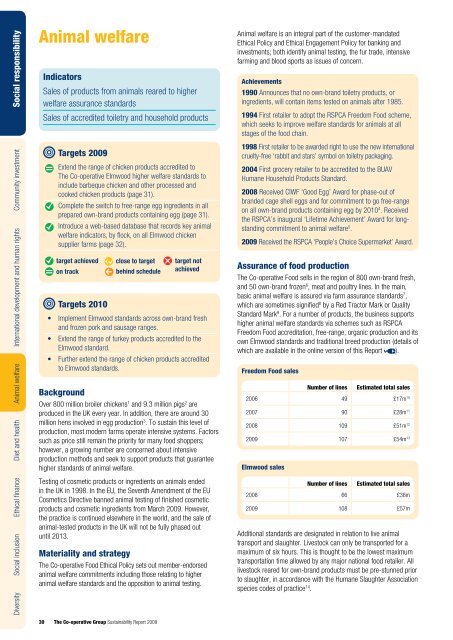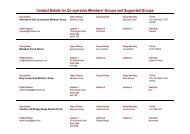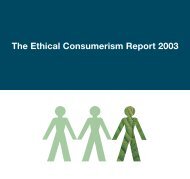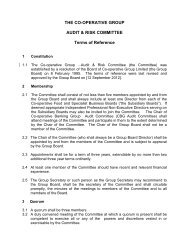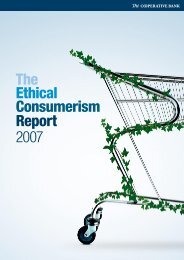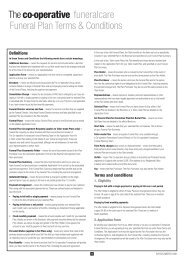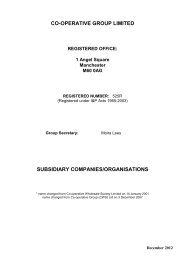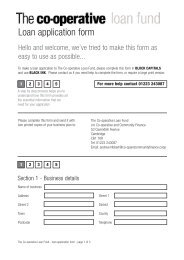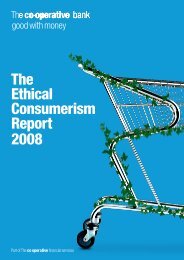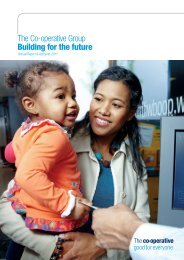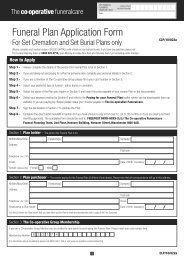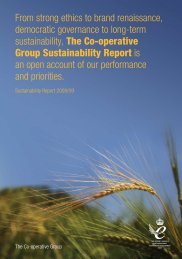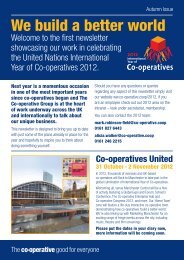Sustainability Report 2009 - The Co-operative
Sustainability Report 2009 - The Co-operative
Sustainability Report 2009 - The Co-operative
You also want an ePaper? Increase the reach of your titles
YUMPU automatically turns print PDFs into web optimized ePapers that Google loves.
Diversity Social inclusion Ethical finance Diet and health Animal welfare International development and human rights <strong>Co</strong>mmunity investment Social responsibility<br />
Animal welfare<br />
Indicators<br />
Sales of products from animals reared to higher<br />
welfare assurance standards<br />
Sales of accredited toiletry and household products<br />
Targets <strong>2009</strong><br />
Extend the range of chicken products accredited to<br />
<strong>The</strong> <strong>Co</strong>-<strong>operative</strong> Elmwood higher welfare standards to<br />
include barbeque chicken and other processed and<br />
cooked chicken products (page 31).<br />
<strong>Co</strong>mplete the switch to free-range egg ingredients in all<br />
prepared own-brand products containing egg (page 31).<br />
Introduce a web-based database that records key animal<br />
welfare indicators, by flock, on all Elmwood chicken<br />
supplier farms (page 32).<br />
target achieved<br />
on track<br />
Targets 2010<br />
close to target<br />
behind schedule<br />
target not<br />
achieved<br />
• Implement Elmwood standards across own-brand fresh<br />
and frozen pork and sausage ranges.<br />
• Extend the range of turkey products accredited to the<br />
Elmwood standard.<br />
• Further extend the range of chicken products accredited<br />
to Elmwood standards.<br />
Background<br />
Over 800 million broiler chickens 1 and 9.3 million pigs 2 are<br />
produced in the UK every year. In addition, there are around 30<br />
million hens involved in egg production 3 . To sustain this level of<br />
production, most modern farms operate intensive systems. Factors<br />
such as price still remain the priority for many food shoppers;<br />
however, a growing number are concerned about intensive<br />
production methods and seek to support products that guarantee<br />
higher standards of animal welfare.<br />
Testing of cosmetic products or ingredients on animals ended<br />
in the UK in 1998. In the EU, the Seventh Amendment of the EU<br />
<strong>Co</strong>smetics Directive banned animal testing of finished cosmetic<br />
products and cosmetic ingredients from March <strong>2009</strong>. However,<br />
the practice is continued elsewhere in the world, and the sale of<br />
animal-tested products in the UK will not be fully phased out<br />
until 2013.<br />
Materiality and strategy<br />
<strong>The</strong> <strong>Co</strong>-<strong>operative</strong> Food Ethical Policy sets out member-endorsed<br />
animal welfare commitments including those relating to higher<br />
animal welfare standards and the opposition to animal testing.<br />
Animal welfare is an integral part of the customer-mandated<br />
Ethical Policy and Ethical Engagement Policy for banking and<br />
investments; both identify animal testing, the fur trade, intensive<br />
farming and blood sports as issues of concern.<br />
Achievements<br />
1990 Announces that no own-brand toiletry products, or<br />
ingredients, will contain items tested on animals after 1985.<br />
1994 First retailer to adopt the RSPCA Freedom Food scheme,<br />
which seeks to improve welfare standards for animals at all<br />
stages of the food chain.<br />
1998 First retailer to be awarded right to use the new international<br />
cruelty-free ‘rabbit and stars’ symbol on toiletry packaging.<br />
2004 First grocery retailer to be accredited to the BUAV<br />
Humane Household Products Standard.<br />
2008 Received CIWF ‘Good Egg’ Award for phase-out of<br />
branded cage shell eggs and for commitment to go free-range<br />
on all own-brand products containing egg by 2010 4 . Received<br />
the RSPCA’s inaugural ‘Lifetime Achievement’ Award for longstanding<br />
commitment to animal welfare 5 .<br />
<strong>2009</strong> Received the RSPCA ‘People’s Choice Supermarket’ Award.<br />
Assurance of food production<br />
<strong>The</strong> <strong>Co</strong>-<strong>operative</strong> Food sells in the region of 800 own-brand fresh,<br />
and 50 own-brand frozen 6 , meat and poultry lines. In the main,<br />
basic animal welfare is assured via farm assurance standards 7 ,<br />
which are sometimes signified 8 by a Red Tractor Mark or Quality<br />
Standard Mark 9 . For a number of products, the business supports<br />
higher animal welfare standards via schemes such as RSPCA<br />
Freedom Food accreditation, free-range, organic production and its<br />
own Elmwood standards and traditional breed production (details of<br />
which are available in the online version of this <strong>Report</strong> ).<br />
Freedom Food sales<br />
Elmwood sales<br />
Number of lines<br />
Estimated total sales<br />
2006 49 £17m 10<br />
2007 90 £28m 11<br />
2008 109 £51m 12<br />
<strong>2009</strong> 107 £54m 13<br />
Number of lines<br />
Estimated total sales<br />
2008 66 £38m<br />
<strong>2009</strong> 108 £57m<br />
Additional standards are designated in relation to live animal<br />
transport and slaughter. Livestock can only be transported for a<br />
maximum of six hours. This is thought to be the lowest maximum<br />
transportation time allowed by any major national food retailer. All<br />
livestock reared for own-brand products must be pre-stunned prior<br />
to slaughter, in accordance with the Humane Slaughter Association<br />
species codes of practice 14 .<br />
30<br />
<strong>The</strong> <strong>Co</strong>-<strong>operative</strong> Group <strong>Sustainability</strong> <strong>Report</strong> <strong>2009</strong>


